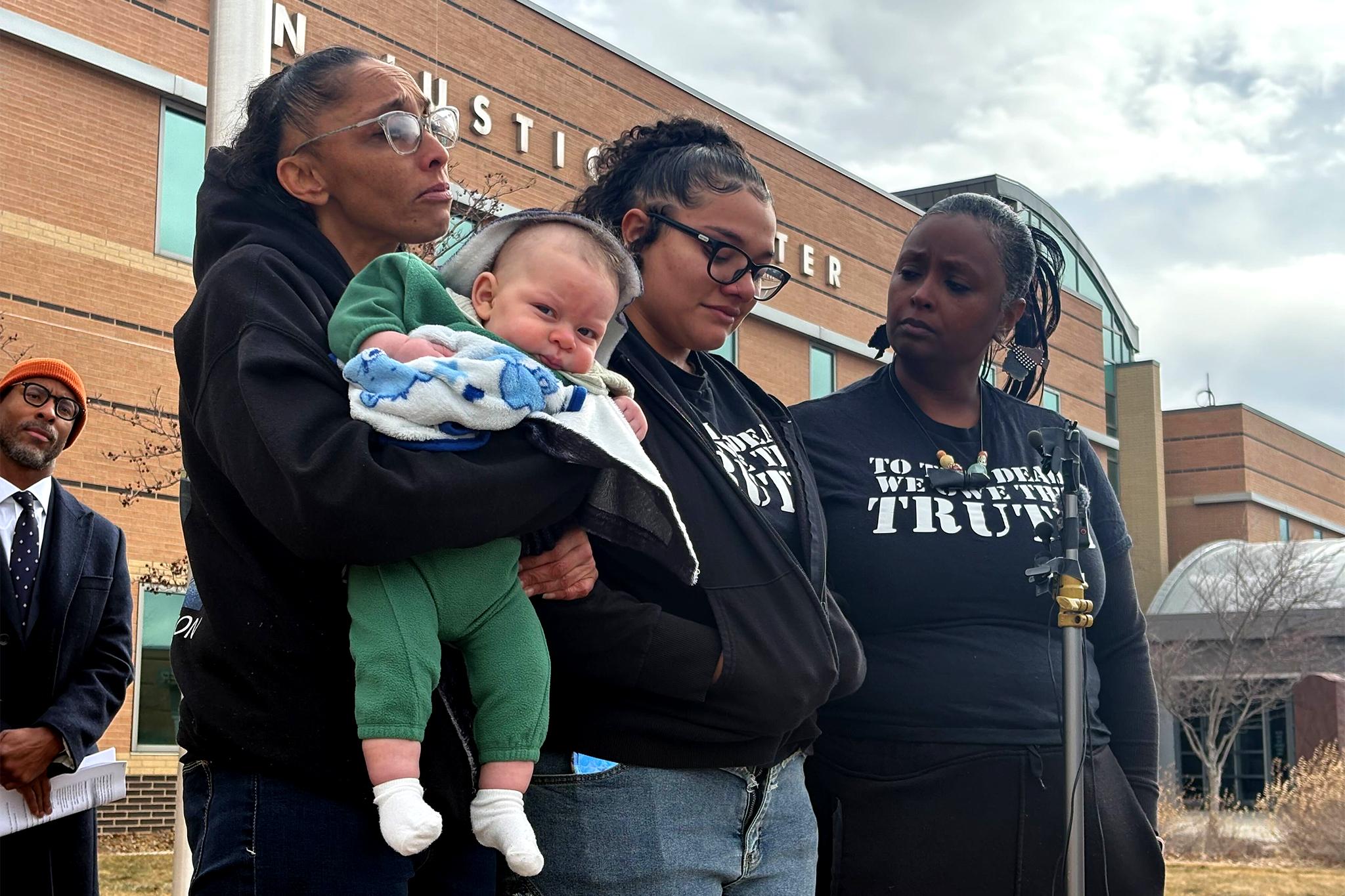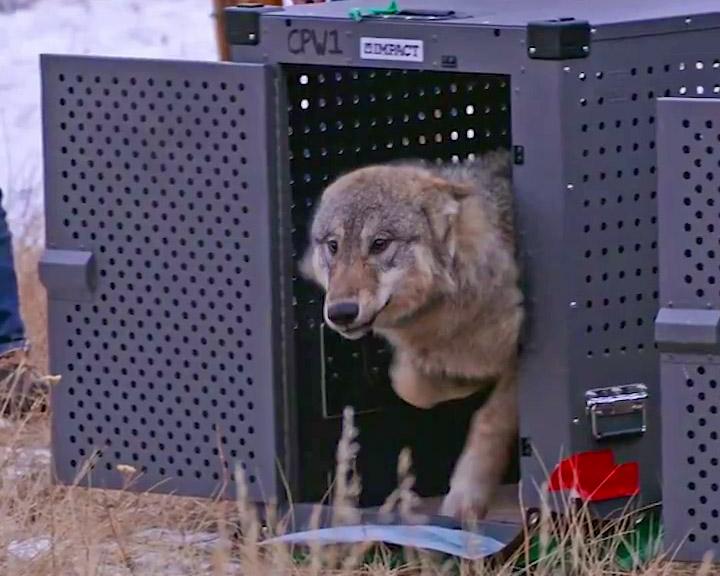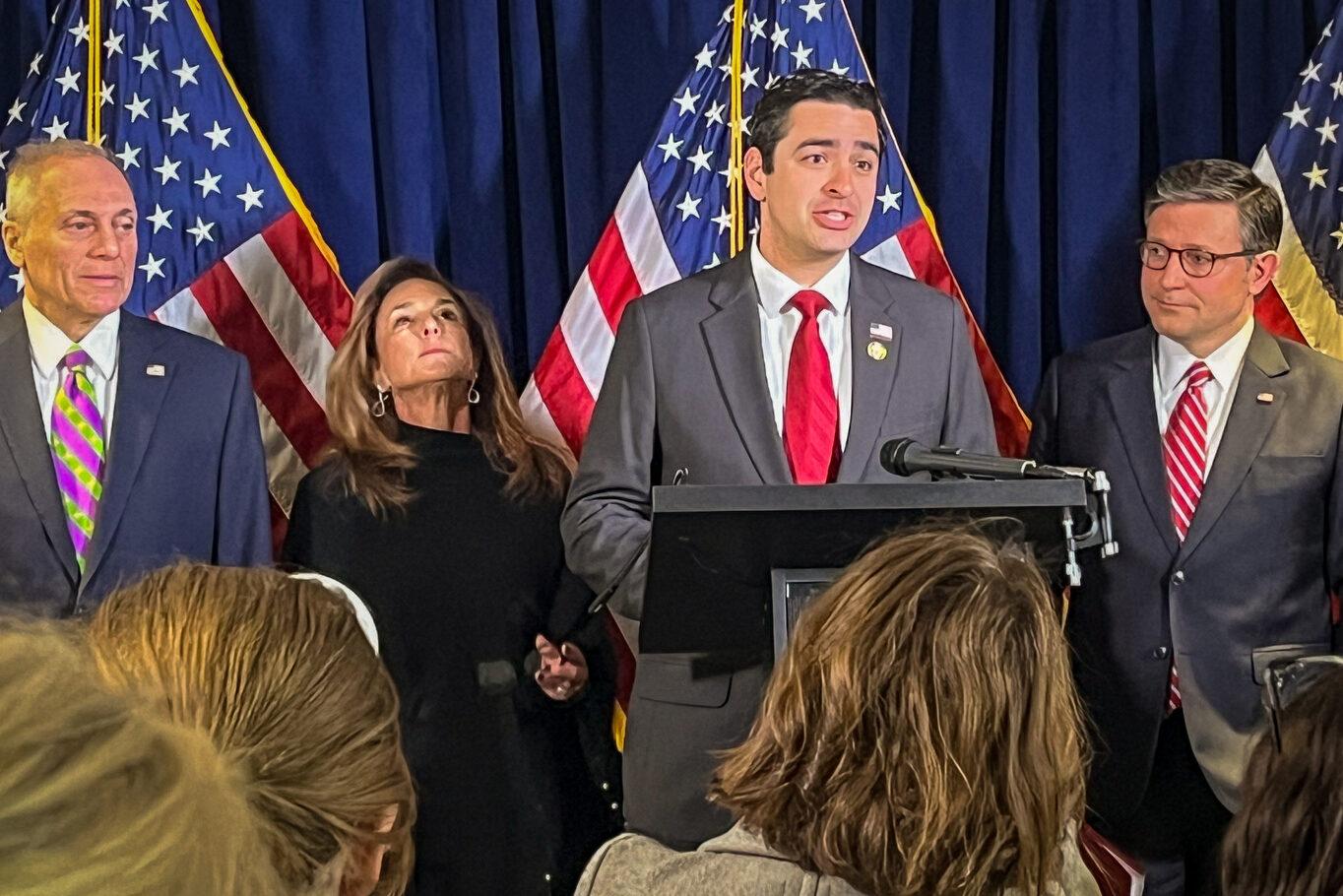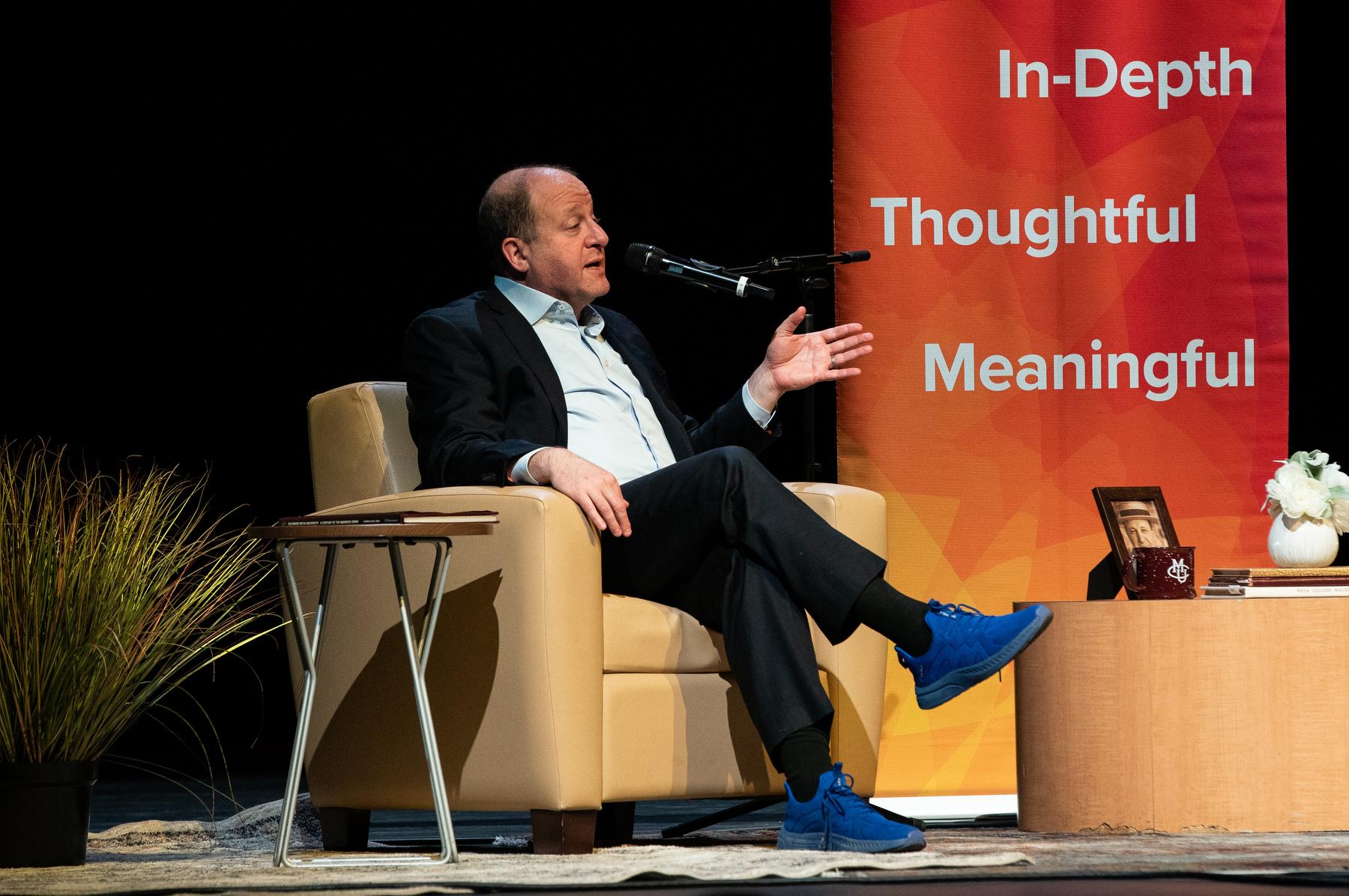
There’s not much Gov. Jared Polis can say about ongoing negotiations over the Colorado River Compact, but he likes the cards his state is holding compared to the alternative.
“It's much better to be Colorado or Wyoming and Utah than it is to be Arizona or California, without a doubt, without a doubt,” Polis told Colorado Matters Senior Host Ryan Warner on Tuesday. “But yes, it's a very perilous and legally fraught area, and we can continue to be strong and be tough and also be part of the solution.”
The seven states in the Colorado River Basin are working out new water sharing arrangements that will replace the century-old Colorado River Compact. At an event held at Colorado Mesa University’s Asteria Theatre, Polis responded to questions from Western Slope residents, several of whom asked about the future of water in the west.
“We are coming to the table,” Polis said. “We're willing to do our part. Colorado is often seen as a leader in the upper basin. When we have a strong opinion, we often try to bring Wyoming, Utah, New Mexico along and we'd love to be able to resolve this outside of the courts and outside federal action, and we're going to do everything we can to do that.”
During the conversation, Polis affirmed his opposition to transmountain diversion, which sends water from the Western Slope to Front Range communities, and voiced support for the ongoing effort to secure water rights from the Shoshone Power Plant in Glenwood Canyon. The effort has broad support on the Western Slope but faces hurdles from frozen federal funding and challenges from Front Range water groups.
Below are other questions posed to the governor, along with his answers. This transcript has been lightly edited for length and clarity.
Ryan Warner: Let's move to questions from folks here on the Western Slope. Many of them in our audience. This is Elaine Taylor.
Elaine Taylor: Thank you governor for your presence here on the Western slope. I am a director of Good Samaritan Free clinic. We offer routine primary medical and mental health care to the uninsured, underinsured, undocumented and underserved people of Western Colorado. We are staffed by well-qualified, volunteer doctors, nurses, and other healthcare professionals. We are already seeing the effects of Medicaid changes and federal regulations and anticipate that we will also be impacted by the rate increase for individual insurance premiums in January. What is happening at the state level to be sure that all Coloradans have access to primary medical and mental health care?
Polis: Boy, there's a lot happening in healthcare and she touched on probably seven or eight things that are going on in healthcare. The biggest changes are because of federal actions, HR1 — the Big (Beautiful) Bill — and then the failure to include the affordability tax credits for the exchange, which we had some round tables here in Grand Junction earlier today with local businesses, very worried about that.
But the net result is not only erosion of Medicaid, but also significant increases in cost in the individual market, which for various reasons are actually most pronounced in Western Colorado in our state — increases as much as 170 to 220 percent in healthcare costs next year if Congress does not renew the tax credit.
It devastating. I mean, let's just put it this way, Ryan, increases where people will, in effect, almost all of them lose their insurance. I mean, there's hardly anybody that can afford a 300 percent increase. Maybe a few could, but by and large, folks will lose their care. They'll have to make the tough decision to go without healthcare insurance
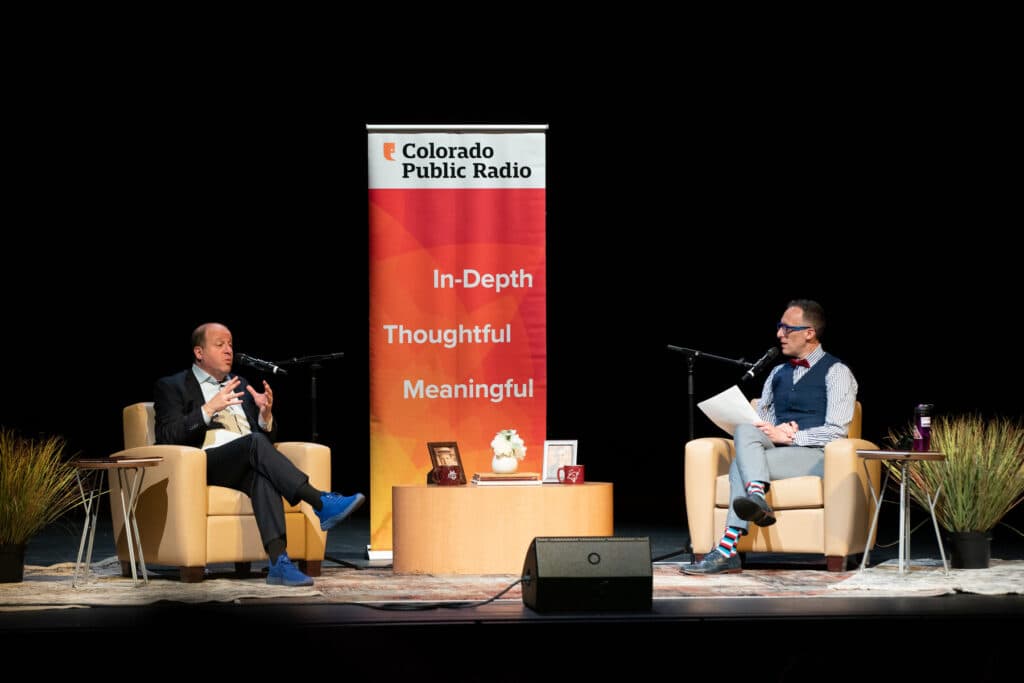
Warner: And who may then show up at the door of the Good Samaritan free clinic?
Polis: Yeah, not may, will. Because again, just because you don't have healthcare coverage doesn't mean that you aren't admitted to a hospital when you need it. You get care, you're unable to pay the bill. It could lead to personal financial distress, bankruptcy, but it also leads to cost being shifted onto others who might think, ‘Hey, I have insurance. I work for a big company.’ Well, guess what? You're going to be paying more too if there's more uninsured Americans and those costs are shifted onto you. So while this is all federal Ryan, we try to do what we can as a state. Frankly, it's been one of my biggest frustrations as governor because one of my areas of focus is saving people money on healthcare. There's a much more limited toolbox that we have at the state level to do this. Even now under both the Biden administration and the Trump administration, our application to, for instance, import prescription drugs from Canada, still hasn't been approved: wasn't approved by (former Secretary of Health and Human Services) Xavier Becerra, wasn't approved yet by (Robert F. Kennedy Jr.). I hope they act on it. I hope they approve it. That would be a small step.
Warner: So, Colorado making that request so that it can buy drugs from Canada?
Polis: Yeah, that's what we've been trying to do since I became governor. But we can't do it without federal permission because it's across national borders and we haven't been able to get that permission yet. That's just one small example, but so much of it is federal that we do what we can. In this special session, you might've heard, I called the legislators back. The main purpose was we had to balance the budget after Congress drilled a big hole in it. But the other part we did is we did provide some additional support for the health exchange to prevent some of those largest increases. But there's still going to be huge increases unless Congress passes the premium tax credit. So I do hope — and Congressman Hurd is now supporting doing that — I hope that other Republicans get on board because they need to get that done or else, especially in Western Colorado, it's going to be absolutely devastating for so many families.
Warner: This is the Republican congressman for this community and into Pueblo as well. So are you taking any specific action to lobby Congress to continue the tax credit?
Polis: Everything and anything, Ryan. So, just today, I sent a very comprehensive letter to our full delegation; Senate and House. That's 10 people, eight House members, two senators, urging them to do this. We're having members of my cabinet (convey) all the information by congressional district, meeting with the members, saying, “This is what it means for people. How many people will lose healthcare? This is the average increase.”
So we are doing all the lobbying that we can to try to get Congress to do that in the next, really, month or so, because these are the prices that take effect in January. But the enrollment period is really October, November. So I mean, unless this happens in the next month or so, these price increases are going to hit and we're going to have a lot more uninsured people here in Western Colorado.
Warner: And I suppose your answer in part to Elaine Taylor when she says what's happening at the state level is: only so much. I think that's what I hear you saying, governor.
Polis: What we can do, we do. If there's other ideas, please let us know. Medicare? entirely federal. Medicaid? Administered by states, but it's fundamentally federal in how they administer it. I mean to get one little waiver for one little policy that we think works can take years and we don't even get it. So the federal government has a very heavy hand in healthcare that prevents the kind of innovations that would make us healthier, reduce costs, and hopefully cover more people. And I hope that's something that changes, but it has been a big point of frustration of mine in this seat.
Warner: Okay, here's Joyce LaBounty from Paonia.
Joyce LaBounty: Our local hospital, Delta Health, is the only hospital in our area. Our hospital was recently stripped of the ability to deliver babies. This is going to cause many families in our region to have to drive an hour or more to make it to the hospital in time for their delivery. What is the state policy on helping hospitals like ours that are facing these large cuts to the budget and to their services?
Polis: So we talked about the impact to individuals who can't afford to be covered, those who get insurance through their company (and) rates go up. There's also a major impact on healthcare providers, rural hospitals and others, many of whom simply won't be able to do business or stay in business with what's happening to both the healthcare exchange and Medicaid over the next few years.
Warner: So are you stating plainly that hospitals will close without interventions?
Polis: Especially rural hospitals. Their current business models don't support them being able to continue to operate the way they have been. So what that looks like for any hospital, it might mean discontinuing certain services. It might mean consolidating, merging. It might mean closing. There is a fund that was set up by HR.1 (for rural hospitals). So we are going to be seeking funding under that, too. We hope, if we get it, that will partially reduce the impact of it. But no, what I see happening in healthcare worries me a lot as an American. We're doing everything that we can as a state, but so much of it is federal. What we can do is maybe five or 10 percent of it and the rest we just have to complain about and try to elect a Congress and a president that will do something about it.
Warner: Okay, so you're saying that under the One Big Beautiful Bill there are funds that you can seek to shore up local hospitals?
Polis: There are. So there's funds for five years, the Rural Hospital Transformation Fund. We think and hope that Colorado could get about $50 million a year to $100 million a year from that. We're working on our application to do that as is every state. And so it won't by any means account for the massive reduction in payments to our rural hospitals by the cutbacks in Medicaid and the exchange. But we hope that we can be innovative and find ways to transform healthcare to provide better value to people.
Warner: You indeed blame much of Colorado's budget shortfall on the One Big Beautiful bill, but legislative Republicans say this is about Colorado's inability to live within its means. Former Grand Junction Mayor turned state representative Rick Taggart sits on the joint budget committee and he tells CPR the federal tax and spending package merely exposes structural problems with the state budget. Have you given that serious consideration?
Polis: Well, it doesn't make any sense, Ryan. We had a healthy budget surplus. Every Coloradan was going to get a TABOR refund, and then Congress passed a bill that reduced Colorado's revenue in the current year by $1.2 billion. So it took a $400 million surplus and turned it into an $800 million deficit. We got rid of that. We balanced our budget. We now have a surplus, again — small, (about) $10 to $15 million surplus. So we've been through all that. We did that. The reason we didn't balance that in April is because we didn't know that HR.1 was going to happen. It happened in July. It happened after we prepared our budget for the following year. Every year we balance our budget in Colorado. Congress should learn from that. Congress needs to balance their budget. They've run larger and larger deficits. HR.1 only made the deficit trillions of dollars larger over the next decade. But no, we always balance our budget here in Colorado. I'll be submitting my next balanced budget November 1.
Warner: So you take no part, no responsibility in any of the budget gaps that have occurred?
Polis: Well, again, I don't understand really what the question means. Ryan, we could have in April — had we known exactly what Congress would pass — we at that point could have said, 'We're not spending $800 million because Congress is doing this” and then we're going to have a balanced budget after they do it.’
But we had no idea what Congress was going to do. So you can't balance a budget to a hypothetical number. Once the president signed the bill, that reduced our revenue by $1.2 billion, then we just rebalanced our budget. That's what we did. We did it all in a few week period. It's not fun to cut things, but we do it. We live within our means here in Colorado. We balance our budget. So we did it again.
Warner: Representative Taggart argues that some of the state's fiscal woes are due to the handling of federal COVID relief dollars that those funds expanded state commitments we can simply no longer pay for. What's your read on that governor?
Polis: Well, again, this whole premise, I'll tell you how the budget process works.
So our spending limit is inflation plus population growth from the previous year. So let's say one year our spending limit is $20 billion. If inflation is 2 percent (and) population growth is half a percent, it goes up by 2.5 percent the next year, and then we don't spend above that. Look, if the legislature wanted to underspend, that would be fine with me. We've actually grown our reserves during the time I've been in office. We grew our reserves from about four or five percent. Now we're at about 13 percent. But generally speaking, Republicans and Democrats, I mean it doesn't matter. Republicans write the budget, too, Democrats, they vote for it. It's bipartisan. They generally spend the money that comes in.
That's not a bad policy. What's bad is if you spend more than comes in and that's what Congress does. And yeah, at the end of the process, I signed the bill, but to somehow think that they would've spent less because they thought Congress was going to do something very specific, and you remember at that time in April, nobody knew if this big bill would even pass. Would there be one bill? Would there be two bills? What would the tax provisions be? I don't think anybody had the foresight to do that. And then of course, once our budget was out of balance, we got back into balance pretty quickly.
Warner: Of course, it was out of balance in the general session. You had a billion dollars to close, too, then?
Polis: No, that was different. That was a reduction in the rate of increase, which is a very different thing. Our budget still went up by let's say it's 3 percent, 2.5 percent inflation-plus-growth year-after-year it went up. And so any cuts in the general session were simply reductions in the rate of increase to the TABOR cap, which was about 2.5, 3 percent.
So again, we left a healthy surplus. Coloradans were all going to get a refund. Because of the federal bill, revenue went down $1.2 billion. The first $400 million was a surplus, which is a pretty big surplus to leave. The next $800 million is why we brought everybody back and we did the cuts we did, and then we're balanced again within about a month. Right? I mean Congress is getting, the deficit's getting worse every year. All the hubbub here was just about, “Oh, it takes us another few weeks to balance it again because of massive changes at the federal level.”
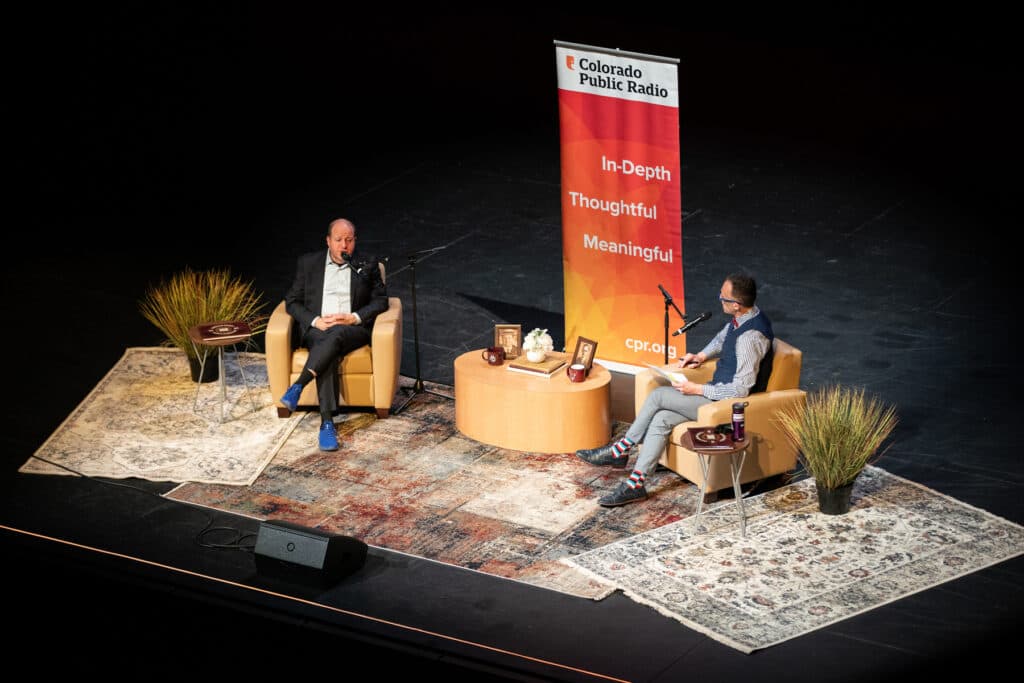
Warner: It has been a vicious wildfire season, which prompts this question.
Chloe Baron: Hi, my name is Chloe Baron and I am concerned about wildfires, increasing home insurance costs. Is there anything you are doing as governor to address this?
Polis: So this is our worst wildfire season since the summer of 2020. I was here in Mesa County just two weeks ago at the command center. We obviously still have, I believe at the latest count, four large fires that are not controlled burning here in Western Colorado.
We've got some lucky breaks from the weather over the last week, but it ain't over yet. I mentioned, also, we've deployed the National Guard across these fires. The state is in a better place than we have been with regard to fire preparation in 2020. It was very challenging and we, for years, relied on an interstate pool of planes. And the problem with that was, what if during Colorado's fires, there's also fires in California or Oregon or New Mexico? We've really moved towards controlling more of our own destiny. We now have two Firehawk helicopters. We have contract tankers.
We still deploy the interstate pool where we can, and we were able to get some additional tanker support from Wyoming during these particular fires, but we have more resources than we ever had to hit them early and quickly. But let's also talk about while of course there's the devastating impact where fires impact people's lives — obviously, the Marshall Fire (burned) over a thousand homes, the most destructive fire in the history of our state. It also raises home insurance for everyone else. And I think that's what the gist of the question was. It was about fires, but it was about homeowners' insurance.
And so the answer is we're doing a lot to try to bring that back down. The effect of this will be next year, but I signed a bill that we worked very hard on that makes sure that insurers give credit for the risk reduction efforts that homeowners and communities do.
Meaning if you take down brush around your home, if it's made of flame-retardant materials … community level, if your HOA, if your town is taking down fuel that could otherwise spread a fire, taking down brushes, taking down trees, we want to see credit for that in the insurance market. So this is something we struggle with, but it's something we can do better on. Same with utility companies. If utilities companies want to spend X dollars on reducing fire mitigation, we want to make sure there's an offsetting reduction to homeowners' insurance for that investment.
Warner: Oh, that's interesting. So the actions of the utility might have an effect on what I pay for homeowners insurance?
Polis: Absolutely. Absolutely. They're one of the big partners in fire risk mitigation. What you do in your home, first of all, again, you ask what can people themselves do? We talked about water — flush your toilet once, etc., but fire reduction actually starts at home. So I mean, I've been to burn scars too many times, Ryan, but it's remarkable to see how there might be four houses next to each other: three are destroyed but one isn't harmed because they took down all the trees and brush around their home and they did the mitigation that was necessary to reduce their risk. It's obviously a die roll, a lottery at the end of the day, but your odds are a lot better if you do that work. So home level, community level, and then yes, utility level as well.
Warner: Beneath Colorado National Monument, a subdivision is going up called Redlands 360. Whose job is it to make sure those homes are insurable? Is it the developers?
Polis: Well, the developer won't be able to sell them if they're not insurable. I mean, there's probably a market, but very few people. You can't get a mortgage without insurance. So I mean, the developer would take an enormous hit if they're not insurable because they wouldn't be able to sell them.
Warner: Does the state have a role in telling people where they can live? Should some forested areas be off limits to people?
Polis: Well, so we call it in Colorado, we use the term wildland urban interface.
And so folks who live in this, and you can define it in different ways, but by population it's probably about 4 percent of our state. And that's where a majority of the fire risk occurs. Not all. I mean like, for instance, the Marshall Fires in Superior in Louisville, that would not have been an area that was defined as (wildland urban interface) and yet it was still a devastating fire. Fires can occur everywhere, but the bulk of the fire damage occurred in that 4 percent. One more thing, it's not just fire. That's where there's bear damage, wildlife damage. So there's a number of issues that also affect insurance rates. By the way, if you've had bears bash in your garage and had to make a claim. So, we have a suite of policies including what we call model development codes for houses in that 4 percent. And so how we use that, we'd like to use that more going forward. We didn't have that before, but how we use that model code to make sure that the houses in the (wildland urban interface) are better protected is something we need to think about going forward.
Warner: You knew this was coming. Governor Polis, a housing affordability question.
Tracy Marshall: Hi, my name is Tracy Marshall and I live in Grand Junction, Colorado. Governor Grand Junction and Mesa County are seeing a sharp rise in housing prices without the commensurate jobs and wages. Starter homes and safe neighborhoods are now well over $400,000, putting home ownership out of reach for many young families like my 27-year-old son and his growing family. The rapid price increases are being driven in part by relocations from Denver and other large cities. What specific steps are you taking or are willing to take to address affordable housing in Mesa County so that working families here have a fair chance at home ownership and stability?
Polis: So there's not one philosophy I have on whether things should be done to the local level, state level, or federal level. I am more of a pragmatist in believing that they should be done.
So, like preventing fires should be done, housing should be done. We have moved to more of a state role in preventing local governments from stopping housing to help solve the problem. Because fundamentally, a lot of the issue was around local governments that weren't allowing housing to be built, had very long approval processes, were decreasing the number of units, and we have slowly been working and saying, “Look, there's a state interest in reducing housing costs.” Doesn't matter whether you live in Grand Junction, Fruita, Palisade, Montrose — housing costs too much, and we need to do something across jurisdictions that reduce the costs and time to build. And that has largely been our focus there, much to the chagrin of some local governments, other local governments supported because they see the problem. But fundamentally, whether it's your president, your governor, your county commissioners, your mayor, people just want to see more housing that they can afford. They don't care as much who does it. They just want to see it get done.
Warner: And so your fundamental assertion there is that supply will bring the price down.
Polis: Well, that's right. I mean, many people here — we're at CMU — and many of you have taken Econ 101. Price is a function of supply and demand. The fact that demand is high is wonderful. It means people want to live in Colorado. We're a wonderful state, good job market, great quality of life, outdoor recreation. You could reduce prices by reducing demand by making Colorado crappy and unlivable, but we didn't really consider that. Instead, we said, “Let's change that other lever: supply.” Let's increase the supply, remove the artificial barriers that keep it low and allow a new pricing equilibrium to reach that's lower given the current level of demand. So that's what we've been focused on from a simple economics perspective.
Warner: But isn't it more complicated than that when you throw in second homes, short-term rentals, the growing wealth gap, which allows some people to move to Colorado and work remotely, who wouldn't otherwise be able to or have wanted to maybe before the pandemic? I mean, there are complicating forces here that make supply and demand?
Polis: No, they're all part of supply and demand. I mean, there are people that are able to make their mortgage. They have their home on Airbnb for two weeks a year while they stay with their mother-in-law in Minneapolis. I mean, there's all sorts of ways that people make it work, and certainly Airbnb is one. Many people own rental properties. Well, guess what? That also is part of the housing solution. I mean, we want ownership. We want people to build equity wealth, but there's a role for rentals and somebody owns three homes and rents two of them. That's part of the rental market. So it's a supply issue no matter how you look at it, no matter how you carve it up. Yeah, there's fascinating intricacies of exactly how the AirBnb, short-term rental, long-term rental affect things, but they're all party to the same total inventory. None of them can. They're all part of the total quantity of housing.
Warner: Okay. A question about homelessness.
Stephania Vasconez: My name is Stephania Vasconez and I am the executive director of Mutual Aid Partners here in Grand Junction. My question is, as rural communities are being increasingly impacted by rising unhoused populations, what lessons can cities like Denver teach us about housing first models?
Warner: Now, that might be a question for Mike Johnston, but do you want to take a crack at it?
Polis: Well, generally, I would say a lot of what Denver has been doing has not been working, so I would not try to emulate what Denver's been doing in Grand Junction or other cities. I think Aurora and Colorado Springs have been better on their approach to homelessness.
Warner: How so?
Polis: Well, I think that focusing on mental health is critical. I mean, I think when they say housing first, sometimes that means even when there's an underlying drug addiction or mental health, you focus on just the housing. It doesn't always work. It doesn't work, perhaps, even most of the time. You really need to focus on the person. And I support models that do that real quickly. It does tie into housing affordability and housing reform. The biggest predictor of homelessness, despite all these other factors, is the cost of housing. The average rental price, average home price in an area correlates perfectly.
Warner: That's a stronger factor than addiction?
Polis: No, no. Well, that's at the individual level. I'm saying you can correlate. You can look at, take the 50 biggest cities, we did this. You do a chart and you say, what's the homeless rate in these 50 cities? What's the average cost of a home? And it fits exactly that. The cities that have higher costs of living — San Francisco, for example, is one of the highest costs of living — have a much higher homelessness rate.
So it factors in as one of the big costs. We want to get back to homelessness, but let me talk a little bit more about the philosophy of the housing reform from the previous question. Imagine a Venn diagram overlapping circles. What we are really focused on is sustainability, livability and affordability, and they all overlap to a great extent. Livability again means your choice, different things for different people. If you want to have a 45-minute commute to your job in a city and have horses and 20 acres, you can, but you all should be able to live near a bus or rail stop right near where you work. Livability means different things to different people's sustainability. How do we reduce our energy footprint, our water footprint, live more efficiently, and then affordability? What's driving all of this? How can people afford to live in our state? Whether you experience the cost of living as rent or mortgage.
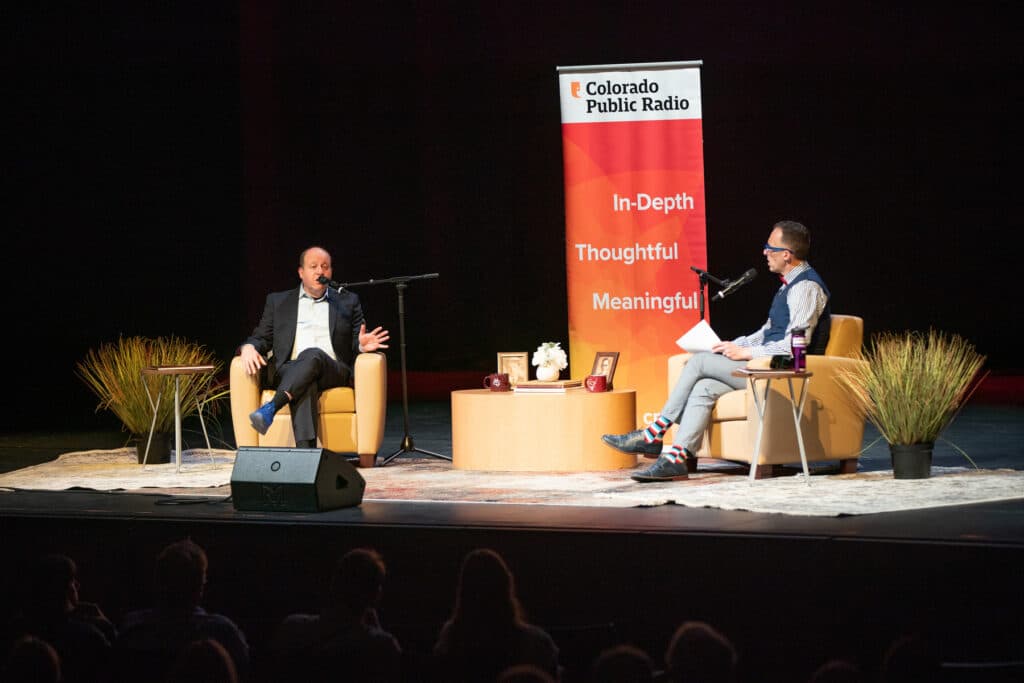
Warner: Let's hear an infrastructure question.
Brenda St. John: Hi, Brenda St. John. I'm a resident of Grand Junction and I've lived on the Western slope since 1979. Up until several years ago. A trip to Denver or from Denver to Grand Junction could take three-and-a-half to four hours or slightly more depending on the weather. Now with all the construction and other delays as well as some complete closures, it takes four-and-a-half to five hours, or not at all, to travel either direction. Are there opportunities for expanded rail service to lessen pressure on I-70 entirely?
Warner: Monorail?
Polis: So yes, obviously it depends on the time of day and when you travel, but there's times when it's hard to get to Denver. Some of that, we're working on the Floyd Hill project, which will be done in about a year-and-a-half. That's some of the delays in that kind of 12-mile stretch (around the) Idaho Springs area, adding a lane there.
Rail is a big focus of ours, but part of it will affect (Interstate) 70 in a positive way. So we're doing two main initial passenger rail projects in my time as governor that we're going to get done. It's not just something we talk about. We're going to deliver passenger rail. One is mountain rail and that's building on, we for years had a seasonal ski train, Denver to Winter Park. We are doing year-round Denver to Granby, and then that will then add on as well, Steamboat (and) Craig.
So it's a mountain rail solution that will take traffic off of that first part — the most heavily trafficked part of Interstate 70, both in winter to get to the mountains, fall for leaf viewing. Obviously, Granby, Rocky Mountain National Park entrance from the west. So that will be year-round next by next winter, so about a year from now, year and a couple months, we will have that in place.
The other big one is Front Range passenger rail. The first part of that is the northern Front Range, and that's largely because there's money in RTD that will help this happen. That's a regional transportation district, and that will be Denver, Fort Collins, Loveland, Longmont, Boulder. Not necessarily is (this) helping immediately with Highway 70, but certainly helping with Highway 25 and some of the congestion that occurs in the Denver Metro. So those are the two that we're getting done. They're funded, they're getting done, and the mountain rail will be online next year, and you will see some improvements on 70 as a result of that.
Warner: Okay. And from a Western Slope perspective, that all sounded great if I live in Littleton but not Collbran.
Polis: Yeah, we're for rail anywhere and everywhere, but it always takes local partners to step up and be part of it. The state is willing to do that if that's a priority in Mesa County. If the commissioners and the mayor are able to come to the table with significant resources, we'd love to have that discussion.
Warner: Okay, so you're telling Brenda: Organize
Polis: Organize, yeah, I mean, passenger rail is never something that can be imposed by the state on people that don't want it. So the people in, for instance, the RTD area voted for rail in 2002.
Warner: And some of them got it, Governor, but not your own community of Boulder.
Polis: Yeah, well that was the Fast Tracks initiative. I think it was 2002. So they've been paying a tax, they've voted to tax themselves for rail. It's now more than 20 years. They weren't able to get it done themselves. Well, they would, but I think they had the year 2040 or something and we said that no, 2040 (was too late), so we said the state will help. So we're effectively working with them to match what they've done to be able to get it across the finish line for that Front Range product, and so that's where we can come in and help.
Warner: Yeah, you said this as definitively as you've said anything tonight we are going to get rail done. Those are not funds then that could be rescinded, for instance, by the federal government?
Polis: No, there's no federal funding. That's part of it. It's, by the way, it's all used in existing track and I could say things like it's not terribly expensive, but then I could say it's a few hundred million. So it is. That is terribly expensive, but most people think about billions and billions for rail. We're not talking about that. We don't have that. So it's adding some positive train control to existing lines, making some station improvements, obviously buying the rolling stock. But yeah, mountain rail will be year round to Granby, and then later on we'll be able to add the Steamboat and Craig piece, and then the Front Range, the northern Front Range will be the first piece. The full promise of Front Range passenger rail all the way (from) Pueblo to Fort Collins will be a few years after that. But we will have the northern Front Range by the end of this decade and mountain rail by next year.

